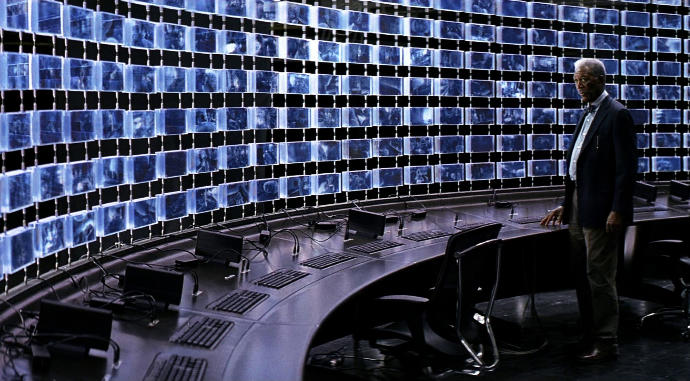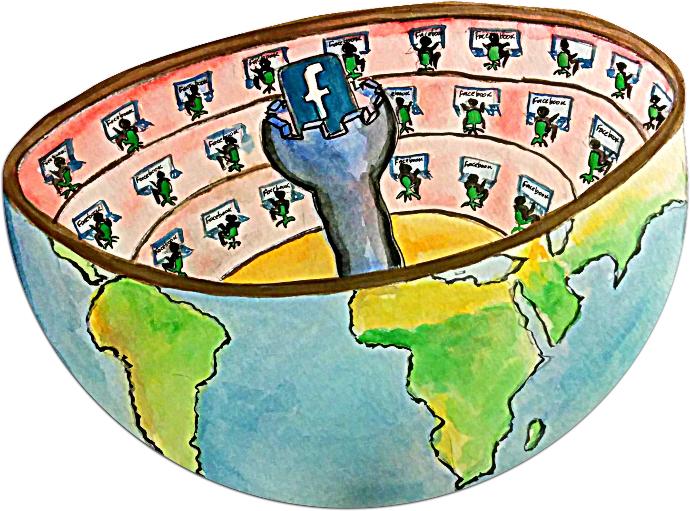
I went a bit more philosophical with this take for three reasons:
1. I’d like for people to be familiar with the concept of Panopticon, which has always intrigued me.
2. We all have social media one way or another, and we visit several websites per day, leaving possible thumbnails in each place we visit on the internet. You are traceable by the websites you frequent, and also by either bank databases, or any other institution you might be affiliated through electronic systems.
3. Pretty much in anywhere you go these days there’s a camera somewhere, and even if there isn’t, everyone carries one so any event might be recorded at any point.
Now, how does the internet and the Surveillance Culture fit within the Panopticon concept?

Panopticon
Social theorist Jeremy Bentham came with the idea of Panopticon in the 18th century. The Panopticon is an institutional building, which allow all inmates to be observed by a single watchman without the inmates being able to tell whether or not they are being watched.
Now, the trick in this concept is the following:
Physically, the watchman cannot observe all cells and all places at once, but the Bentham designs suggests that the inmates don’t know when or how they are being watched, so subconsciously they’ll act as if they’re being watched at all times. The effect here is that the inmates are being instantly and constantly controlled at all times.

You can read more about the Panopticon here. This is what Jeremy Bentham said about his designs:
"Morals reformed—health preserved—industry invigorated—instruction diffused—public burthens lightened—Economy seated, as it were, upon a rock—the gordian knot of the Poor-Laws not cut, but untied—all by a simple idea in Architecture!—Thus much I ventured to say on laying down the pen—and thus much I should perhaps have said on taking it up, if at that early period I had seen the whole of the way before me.
A new mode of obtaining power of mind over mind, in a quantity hitherto without example: and that, to a degree equally without example, secured by whoever chooses to have it so, against abuse.—Such is the engine: such the work that may be done with it. How far the expectations thus held out have been fulfilled, the reader will decide."

Surveillance Culture
Our modern society is unquestionably run under a Surveillance Culture. We are still not in a position where you can be traced anywhere-anytime, but we are pretty close to that. People who live in the poorest parts of third world countries, or people who live in rural areas are probably the ones who aren’t as affected by the Surveillance Culture we live in under.
Important information from each individual is handled by banks and such, but let us not go that far, this is not about conspiracy theories or being paranoid.

With that said, probably the most important event of how influential and how affecting to our lives is the Surveillance Culture, is the Edward Snowden incident. An ex-CIA programmer who published classified documents of the NSA. His leaks proved that there are global surveillance programs running right now, and that telecommunication companies (phone providers, internet providers, etc) are in cooperation with governments to share information.
Now, if you didn’t know any of that, you’re probably living under a rock, but I think it’s common knowledge we can be watched at any time. Heck, your laptop webcam could be monitored at this given moment because of some odd porn website, or music download site you tried to access, or download from.
(Just a very superficial example of that):
Now, setting aside the fact that governments handle private information on every citizen, and that you might be vulnerable to being either hacked or spied on, how do we contribute to the Surveillance Culture?

Everyone who has social media can be easily traceable and is easily identifiable. Face recognition and auto-tagging in photos and videos may be just the beginning of a very immediate system of identification. That’s why it’s important to keep your social media uploads at minimum.
Try not to share lots of information about your family, or about yourself; Habits, preferences, things you dislike and every bit of detail about you and the people who surround you. Most importantly, try to keep at minimum the places you frequent and posting about your current location. Be very discrete, modest and sporadic when it comes to what you share on the websites you’re signed into.

Snapchat, I think, is the perfect example of surveillance. Hardly, there’s any violation of privacy you posting whatever you’re doing throughout the day, and others doing so, so you can constantly watch what others are also posting throughout the day. It’s pretty much by volition we chose to share, even our most intimate moments with our families or our significant others. Well, assuming people aren't recording others without consent, which we know it isn't the case all times.

I was using private transportation one day, and I sit behind a couple of high school students. Turns out an old guy gets in the bus and starts preaching about the Bible and stuff. The kid in front of me started recording the guy preaching, and I could slightly look over its shoulder him typing something and making silly faces while the guy was being recorded.
Now, it’s obvious the kid was mocking the random preacher, but what really upset me was that I noticed I was also visible in the video sitting down alongside the guy who was standing up in the middle of the bus preaching. I realized this, and because of my old fuck spirit I went and told the kid:
“Excuse me, I realized you were recording and I noticed I appeared in your video. I’d appreciate if you didn’t publish that”.
I was reaching my stop already and the kid said nothing to me. I don’t know if the kid published the video or not, but I was just trying to make him aware of it, and even though it wouldn’t really bother me if it was published, I still wouldn’t appreciate appearing in his mockery video even if I wasn't doing anything.

I used to run from cameras when people were recording, but now how do I know when someone is recording anything at any time with their smartphones. Some of my friends have recorded me while hanging out, or simply doing nonsense, and even though I know they think it's harmless, it does bother me a bit and quite frankly kind of makes me paranoid. You can be recorded at any time now, and be published in just a few seconds after being recorded regardless of any context, and without consent.

That is how we contribute to live under the Surveillance Culture. Every revenge video published about ex boyfriends/girlfriends, every nude pic you share about someone else (specially pictures that girls confide to guys), every time you forward a terrible accident, a shocking video of a murder or anything of the sorts, and just in general every time you help make viral to lower or big scale any sort of scandal or gossip about someone else you are already contributing to the Surveillance Culture.

Technology has built a society that has moved the concept of Panopticon, into much more than a physical one, but a digital one.
Shoshana Zuboff, a Harvard egressed and Ph.D in social psychology wrote a book called In the "Age of the Smart Machine", in which, even though I personally haven’t read it, it has come to my attention that she compares the Panopticon to how computers are used to track behaviors, efficiency, etc, on workers, while workers are not able to tell they are being monitored/spied on.

Gertrude Himmelfarb, an American historian called the concept of Panopticon: “A tool of oppression and social control”.
Michel Foucault, a French philosopher coined the term “panopticism” and stated: “The Panopticon is an ideal architectural figure of modern disciplinary power. The Panopticon creates a consciousness of permanent visibility as a form of power, where no bars, chains, and heavy locks are necessary for domination any more.”

If it hasn’t rung any bells, you’ll realize by now we live in a society ran under “panopticism”. Within a political structure, and enforced by a social structure -- ourselves.
 Girl's Behavior
Girl's Behavior  Guy's Behavior
Guy's Behavior  Flirting
Flirting  Dating
Dating  Relationships
Relationships  Fashion & Beauty
Fashion & Beauty  Health & Fitness
Health & Fitness  Marriage & Weddings
Marriage & Weddings  Shopping & Gifts
Shopping & Gifts  Technology & Internet
Technology & Internet  Break Up & Divorce
Break Up & Divorce  Education & Career
Education & Career  Entertainment & Arts
Entertainment & Arts  Family & Friends
Family & Friends  Food & Beverage
Food & Beverage  Hobbies & Leisure
Hobbies & Leisure  Other
Other  Religion & Spirituality
Religion & Spirituality  Society & Politics
Society & Politics  Sports
Sports  Travel
Travel  Trending & News
Trending & News
Most Helpful Opinions